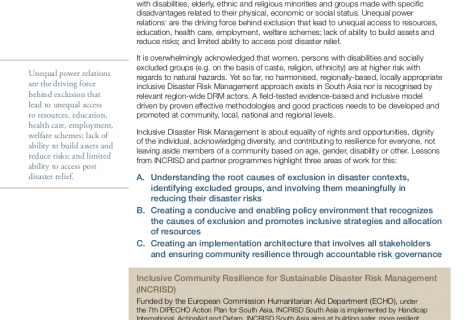
Inclusive Disaster Risk Management (DRM) is about equality of rights and opportunities, dignity of the individual, acknowledging diversity, and contributing to resilience for everyone, not leaving aside members of a community based on age, gender, disability, identity or any other limiting condition.
Women, persons with disabilities and socially excluded groups are at significantly higher risk within a population with regards to natural as well as technological hazards. A harmonised, regionally-based, locally appropriate inclusive DRM approach needs to be developed and recognised by relevant region-wide DRM actors. A field-tested and evidence-based, inclusive model driven by proven effective methodologies and good practices needs to be promoted at community, local, national and regional levels.
To ensure the inclusion perspective, particularly vis-a-vis gender, disability and socially excluded groups, a focussed approach and the framework for inclusive disaster risk management needs to be an integral part of the post-2015 DRR framework, achieved through:
- Understanding the root causes of exclusion in disaster contexts, identifying excluded groups better, and involving them meaningfully in reducing their disaster risks
- Creating a conducive and enabling policy environment that recognises the causes of exclusion and promotes inclusive strategies and allocation of resources
- Creating an implementation architecture that involves all stakeholders and ensuring community resilience through accountable risk governance
This paper argues the case for building safer, more resilient communities in South Asia using evidence-based inclusive approaches to Disaster Risk Management (DRM) through multi-stakeholder engagement. It is based on the learning from the Inclusive Community Resilience for Sustainable Disaster Risk Management (INCRISD) South Asia project, currently being implemented in Afghanistan, Bangladesh, India, Nepal, Pakistan and Sri Lanka by ActionAid, Handicap International and Oxfam with support from European Commission Humanitarian Aid Department (ECHO), under the 7th DIPECHO Action Plan for South Asia. While this paper is based on South Asia experiences, recommendations and approaches are meant to have a universal application.